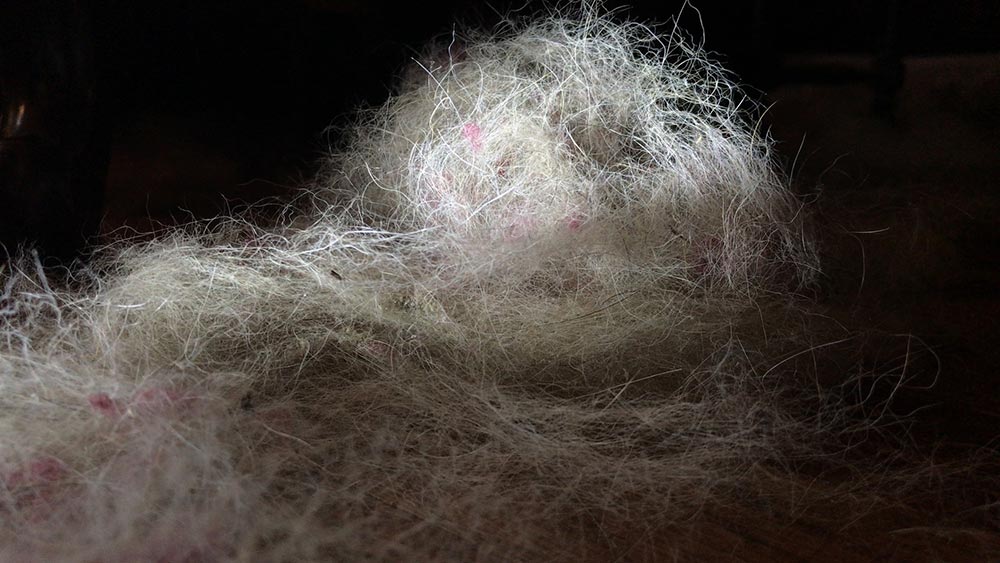Revisiting Moyra Davey’s films on the occasion of her current series at the Museum of Modern Art, I found that I hadn’t remembered how sharply self-critical they are.
“I’m piecing together fragments because I don’t yet have a subject,” Davey says early in her 2016 video Hemlock Forest, her on-screen narration ironed of affect into her typical Kim Gordon–esque incantation. “A French writer said, apropos of fragments, ‘using is easier than inventing,’ and he wondered how he might pass from notes and fragments to the novel.” It’s a sentiment Davey revisits often in her work, not a dismissal of her own talents but a real-time frustration that she and her frame may not be conveying enough. Davey dances around ideas and personal histories that she is reluctant to share, pacing anxiously on the outskirts of her composition in contrast to the practiced monotone she speaks into her handheld recorder.
In both Hemlock Forest and Les Goddesses (2011) Davey speaks of wanting to shoot on the 1 train, to recreate scenes from Chantal Akerman’s News from Home (1977), but she is overwhelmed with shame and nerves at invading the lives of strangers. She shoots the footage, but it is only glimpsed hurriedly before retreating to her Washington Heights apartment, where the films more comfortably expand. It’s an endearing admission, certainly relatable, and one not expressed nearly enough in non-fiction filmmaking. Back at home, among the towers of papers, books, and photos in her own archives, Davey manages to eke miles from those fragments. She is a documentarian for those who prefer metadata to psychodrama.
Les Goddesses (2011), which plays in conversation with Jennifer Montgomery’s Allocution (2022), is drawn from connections between the histories of Mary Wollstonecraft and her daughters (christened “les goddesses” by a friend of the family) and Davey’s own rambunctious sisterhood—herself and three sisters rebelling in the confines of a Catholic household in Montreal. Illness, personal tragedy, fraught relations, and addiction shadow the perimeter of Davey’s narration, though she attempts to avoid specifics or unnecessary details as she zig-zags across her apartment, occasionally interrupted by her dog, a stray thought, or a change in lighting. There are memories that saturate the project that “we might never be ready to tell,” Davey says as the camera watches snowflakes caught in a loop of circulating air outside her window. Revealing these “wet” thoughts would give way to “an uneasy feeling of cannibalizing myself.” She keeps these disclosures written down in a folder marked “Pathography;” documents which reside somewhere in the unseen interior of Les Goddesses’s dusty stack of fragments.
Hannah Paveck quotes Davey describing herself as “a flâneuse who never leaves her apartment,” which reminds me both of Lauren Fournier’s description of intertext-heavy memoir as a “terrain of citations” and Agnes Varda’s mimetic “gleaning” from physical mementos and souvenirs. Jennifer Montgomery’s films also exemplify this interior cartography; a talking cure where multimedia takes the place of exposure. Montgomery and Davey share more artistic DNA than I had originally realized; MoMA’s press notes explain that Davey shot her short film Hell Notes (1990) on Montgomery’s Super 8mm camera, and Davey aided in multiple capacities on Montgomery’s feature Art for Teachers of Children (1995) and 8mm short Home Avenue (1989).
Allocution—Montgomery’s new short—is difficult to describe in brief, and doing so would perhaps rob it of its proper context. Suffice to say that it serves as a documentary coda to Art for Teachers of Children (1995), a film in which Montgomery revisits, questions, and chronicles her childhood affair with the photographer Jock Sturges (here named Jack and portrayed by the late artist Duncan Hannah) years later when their correspondence is discovered by the FBI—she was fourteen, he was twenty-seven and her resident advisor at boarding school. Allocution and Les Goddesses pair well in their refusal to “cannibalize themselves.” They are both discursive self-investigations; pain processed in the lowest of keys. Watching both films, I thought, as I typically do, of my favorite line from Art for Teachers of Children. When her girlhood letters are submitted to the court as evidence, Montgomery wonders in voiceover, “Would the jury know enough to think, ‘By now she’s a much better writer’?” The discourses of disclosure and art-making become interminably intertwined.
Les Goddesses and Allocution screen tonight, October 8, at the Museum of Modern Art as part of their mid-career survey of Moyra Davey. Directors Davey and Jennifer Montgomery will be in attendance for a conversation.



